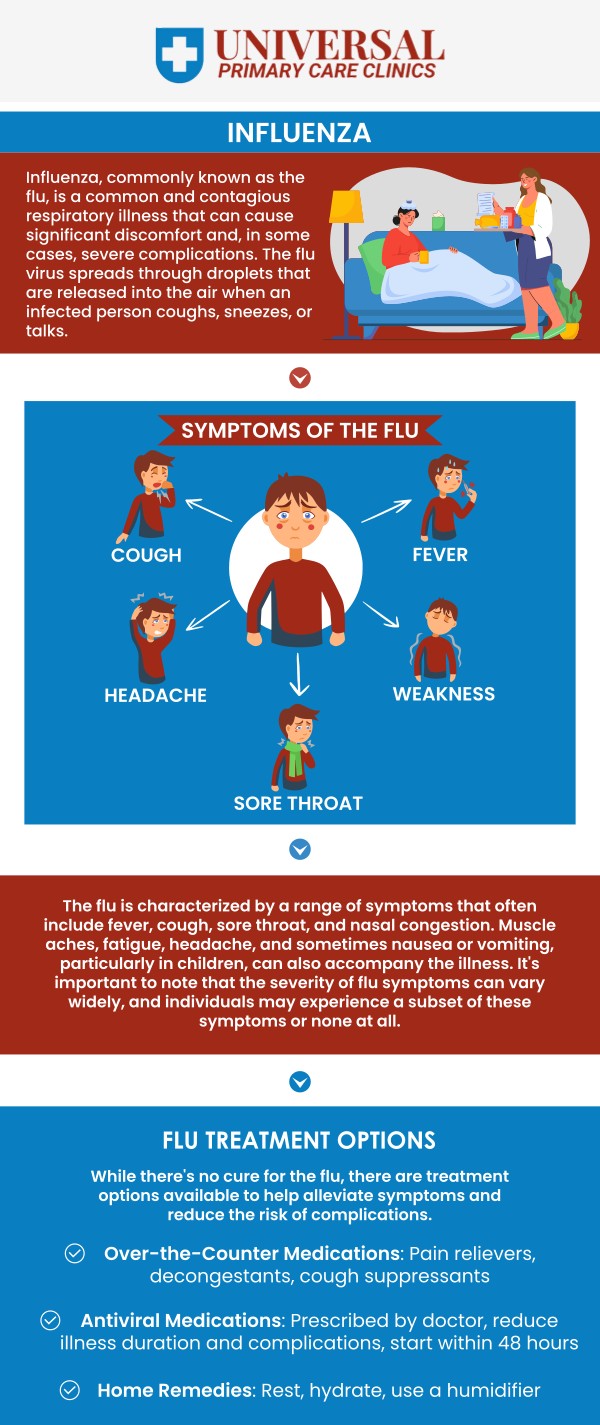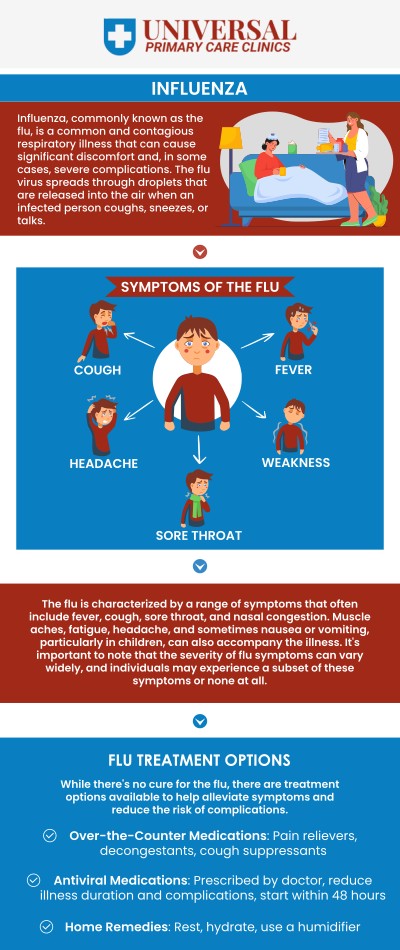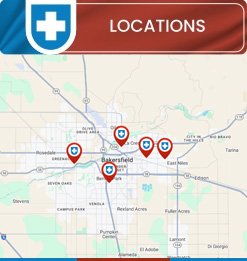Influenza Treatment at Brimhall Primary Care Center, Ming Primary Care Clinic, Niles Primary Care Clinic, Universal Q-Street Primary Care, and Niles Family Medicine in Bakersfield, CA
Effective influenza treatment focuses on relieving symptoms and preventing complications. Rest, hydration, and over-the-counter medications help manage fever, body aches, and congestion. Antiviral medications, if started within 48 hours, can reduce symptom severity and duration, particularly for high-risk individuals. For more information, contact us or book an appointment online. We have convenient locations at Brimhall Primary Care Center, Ming Primary Care Clinic, Niles Primary Care Clinic, Universal Q-Street Primary Care, and Niles Family Medicine in Bakersfield, CA.


Table of Contents:
What is the best way to treat influenza?
How long does it take to recover from the flu?
When should I see a doctor for influenza treatment?
What should I do if my flu symptoms worsen?
Proven Influenza Treatments That Promote Fast and Full Recovery
Influenza, a common yet potentially serious respiratory illness, requires prompt and effective management to prevent complications, especially in high-risk groups. At Universal Primary Care, we provide comprehensive, tailored care for influenza management.
Antiviral Medications:
Timely use of antiviral medications, such as oseltamivir (Tamiflu) or zanamivir (Relenza), can significantly reduce the severity and duration of flu symptoms. These treatments are most effective when started within 48 hours of symptom onset, particularly for high-risk individuals, including children, the elderly, pregnant women, and those with chronic conditions.
Symptomatic Treatment:
Our healthcare teams emphasize rest, hydration, and the safe use of over-the-counter medications to manage fever, body aches, and congestion. Consultations are available to address symptom management, especially for patients with pre-existing conditions.
Supportive Care:
To minimize flu transmission and support recovery, we advise proper hygiene practices, including frequent handwashing and disinfecting surfaces. Patients are encouraged to isolate at home and maintain good nutrition to boost immune function.
Specific Considerations:
We prioritize early intervention for high-risk patients to reduce the likelihood of severe complications. For those requiring hospitalization, we ensure seamless coordination of care, including access to intravenous fluids and oxygen therapy.
Prevention:
Annual flu vaccinations, available at our clinics, remain the most effective preventive measure and are recommended for everyone over six months of age.
For personalized flu care, our clinics are here to support your recovery and prevent complications through early intervention and expert guidance.
At Universal Primary Care, we understand the challenges of flu recovery. While most individuals recover within one to two weeks, factors like overall health, age, symptom severity, and underlying conditions can impact recovery time.
Recovery Timeline for Influenza (Flu):
Early Stage (Days 1-3): Symptoms such as fever, chills, muscle aches, and fatigue appear suddenly and may be intense as the virus replicates.
Middle Stage (Days 4-7): Symptoms peak, including high fever, cough, sore throat, and runny nose. Over-the-counter medications can alleviate fever and aches.
Later Stage (Days 8-14): Symptoms begin to subside, but fatigue and a lingering cough may persist as the body heals.
Factors Affecting Recovery Time:
● Age: Older adults and young children may take longer to recover.
● Health Status: Chronic conditions or weakened immunity can prolong recovery.
● Symptom Severity: Severe flu cases may require extended recovery time.
● Treatment: Early antiviral treatments can reduce recovery time and risk of complications.
Tips for Recovery:
● Rest and stay hydrated.
● Use over-the-counter medications for symptom relief with guidance from our healthcare team.
● Avoid caffeine and alcohol to prevent dehydration.
● Stay home to avoid spreading the virus.
Preventive Measures:
Annual flu vaccinations, available at our clinics, and good hygiene practices reduce the risk of infection.
Our team is dedicated to supporting your health and recovery. Contact us for guidance or if symptoms worsen or persist.
At Universal Primary Care, we prioritize your health and well-being, especially during flu season. Influenza, commonly known as the flu, is a viral infection that can lead to a range of symptoms, from mild discomfort to severe illness. While many people recover with rest and supportive care, certain symptoms warrant prompt medical attention.
When to Contact Us:
● If you experience difficulty breathing or shortness of breath.
● When persistent chest pain or pressure intensifies or does not subside.
● In cases of severe muscle pain that impacts daily activities.
● If a fever persists for more than three days or exceeds 101°F (38.3°C).
● When a cough produces green or yellow sputum, indicating a possible infection.
● For feelings of fullness or pain in the sinuses or ears.
● If flu symptoms worsen or show no improvement after five days.
● In the presence of a high fever that does not respond to over-the-counter medications.
● When signs of dehydration occur, such as dizziness, infrequent urination, or a dry mouth and throat.
● If flu symptoms return after initial improvement, it could suggest a secondary bacterial infection.
High-risk individuals, including young children, older adults (50 years of age or older), pregnant women, and those with chronic health conditions like asthma, diabetes, or heart disease, should seek medical advice promptly if they suspect influenza. Those with weakened immune systems are also at higher risk for complications, and early treatment with antiviral medications may be beneficial.
If you’re a patient at Brimhall Primary Care Center, Ming Primary Care Clinic, Niles Primary Care Clinic, or Niles Family Medicine and your flu symptoms worsen or persist beyond 10 days, it’s important to take prompt action. Persistent or worsening symptoms could signal a severe flu case or complications requiring medical attention.
Signs to Watch For:
● High fever that persists or returns after improvement
● Severe headache, body aches, or fatigue
● Persistent cough with green/yellow mucus
● Shortness of breath or chest pain
● Confusion, seizures, or neurological symptoms
● Worsening nausea, vomiting, or diarrhea
Seek Immediate Care:
If these symptoms occur, visit your healthcare provider promptly to prevent complications like pneumonia or sepsis. Early treatment, including antiviral medications, can reduce illness severity when started within 48 hours of symptom onset.
Rest and Home Care:
● Stay hydrated with water, herbal teas, or broths.
● Rest to support recovery.
● Use over-the-counter medications for fever, aches, and congestion.
● Gargle with salt water to ease a sore throat.
● Use a humidifier to relieve congestion.
● Avoid alcohol and caffeine to prevent dehydration.
● Practice good hygiene, including frequent handwashing and isolating to prevent flu spread.
Follow-Up Care:
After recovery, a follow-up visit may be recommended to ensure full recovery and monitor for complications. If severe or unusual symptoms develop, seek emergency care immediately.
Universal Primary Care offers trusted influenza treatment options to help patients recover quickly and comfortably. Our providers assess the severity of symptoms and create a care plan focused on relief and prevention of further spread. With our supportive guidance, you can get back to feeling healthy sooner.
Our team is here to support your health and recovery. For more information, contact us or book an appointment online. We have convenient locations at Brimhall Primary Care Center, Ming Primary Care Clinic, Niles Primary Care Clinic, Universal Q-Street Primary Care, and Niles Family Medicine in Bakersfield, CA. We serve patients from Bakersfield CA, Maltha CA, Kayandee CA, Panama CA, Arvin CA, Fairfax CA, Rosedale CA, and surrounding areas.
Check Out Our 5 Star Reviews



Additional Services You May Need
▸ Annual Physical Exam
▸ COVID-19 Testing
▸ Chronic Disease Management
▸ Vaccinations
▸ STD Testing
▸ Primary Care
▸ Influenza (Flu)
▸ Common Cold
▸ Asthma
▸ Medical Weight Loss
▸ Diabetes
▸ School Physicals Exam
▸ Sports Physicals
▸ EKG
▸ Geriatric Care
▸ View All Services


